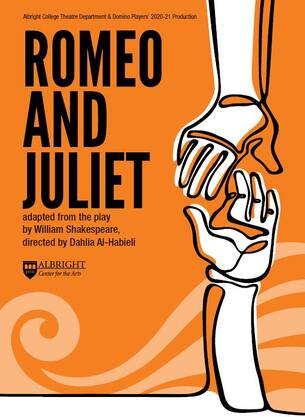|
Student Collaborators: Makenzie Mettler ’22, Kadeem Preston ‘23, Bence Veres ‘21, Kyle Zayas ‘23
We opened the session by going around the group and sharing goals and perspectives. All of the students expressed the desire to actively participate in the production process of Romeo and Juliet either onstage or off. Kyle, a musician, finds the musicality of Shakespeare’s language appealing; it is not a stretch to imagine the script as a musical score, with the meaning and intent of each utterance determined by pitch, tempo, rhythm… Meanwhile, Kadeem claimed to be less than enthused by the language of the play, which he described as “whack” towards the beginning of the session. However, Kadeem was also the one to point out the significance of the structure of Juliet and Romeo’s first interaction; their dialogue creates as single sonnet- they literally complete each others’ thoughts. Methinks Kadeem doth protest too much. After listening to and reading along with Act 1, we spoke about the significance of the Prologue and the reasons why Shakespeare might have included it. Film aficionado Bence shared his frustration with predictability in storytelling, and how disappointing it can be to feel to end up steps ahead of the story being told. On the other hand, Marvel fan Kadeem pointed out how although the outcome of the Avengers films is canon, how the films arrive at the outcome is what made them exciting. Professor Emma Smiths speaks eloquently about this distinction between the What Happens and the Why of Shakespeare’s plays in this short podcast episode. Makenzie was surprised and quite delighted by the audio production’s interpretation of the Nurse, who is a character that can be incredibly humorous and extremely exasperating to varying degrees. Scene 3 gives us limited information about Lady Capulet and Juliet’s reaction to the Nurse’s long-winded reminisces, but the performance we listened to included amusing attempts to interject and much shared laughter among the women. We were reminded that our understanding of character in performance is not only determined by the choices made by the actor playing that part, but by the responses of the other characters. Speaking of which- the students found themselves rolling their eyes at Romeo’s coy dramatics in response to Benvolio’s patient inquiries. As we explore Romeo’s other relationships in the play- between him and his parents, Benvolio, Mercutio, Friar Laurence, and Juliet- and more deeply consider the world that these characters exist in, the more significance this entertaining scene might take on. I am looking forward to reading the play backwards with the students and returning to examine the choices Shakespeare makes for Romeo early in the play. It might be easy to judge the perceived naivete of Romeo and the rest of the adolescents in the story, but as Kadeem pointed out, our introduction to the Lords Capulet and Montague is one where they must be broken up like children brawling on the playground by the Prince, who is arguably the only adult in Verona. Given the available role models, the behavior of the adolescents is, perhaps, understandable. Some questions we were left with at the end of the session were: How old is Romeo? And, what is the cause of the Capulet-Montague feud?
0 Comments
Leave a Reply. |
April 2021
Albright College Theatre |

 RSS Feed
RSS Feed